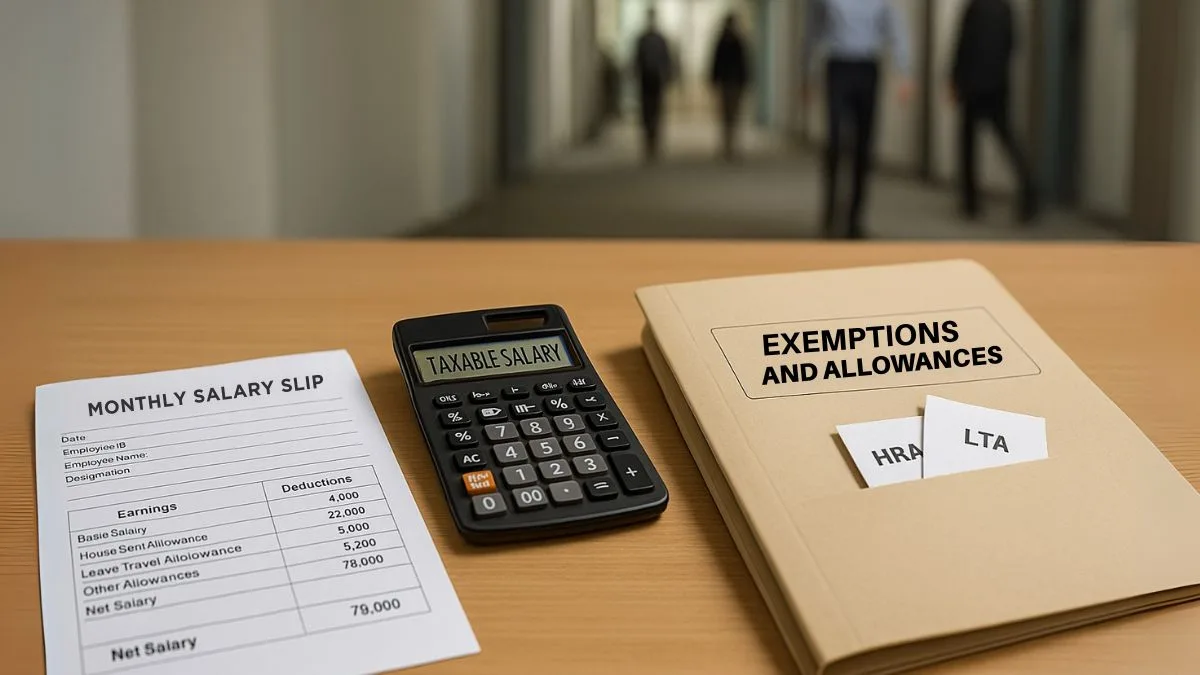
Income tax in India operates on a structured system where every type of income is categorized under specific heads. This categorization is not arbitrary—it helps taxpayers understand their liability & claim the right deductions or exemptions. One of the most important guiding principles in this system is Section 14(i) of Income Tax Act.
This section not only outlines the heads of income but also highlights exemptions for certain allowances & perquisites, ensuring that employees and taxpayers are not burdened unfairly. It essentially answers the question: under which head will my income be taxed, and what exemptions can I claim?
What is Section 14(i) of Income Tax Act?
Section 14(i) of Income Tax Act is a fundamental provision that organizes income into different heads for taxation. Without this classification, calculating tax liability would become extremely confusing.
It specifies that:
- All the money you earn must be sorted into one of the following categories:
- Income from Salaries
- Income from House Property
- Profits & Gains of Business or Profession
- Capital Gains
- Income from Other Sources
This structured approach ensures consistency in tax treatment & avoids double taxation.
Importance of Section 14(i)
The section is significant because it:
- Provides clarity – Every type of income is allocated under a head, leaving little room for confusion.
- Helps in exemptions – It also provides tax exemptions on specific allowances given to employees."
- Ensures fairness – By defining categories, it ensures that taxpayers are taxed only under the right provisions.
For example, income from house property is positive then Gross Total will include it, but deductions like municipal taxes & standard deductions will also be applied.
Also Read: Save Tax on Capital Gains by Investing in a Residential House
Section 14(i) and Allowances
One of the key benefits of Section 14(i) is that it provides for the exemption of certain allowances & perquisites. These allowances are given to employees to meet specific expenses, and the law recognizes that taxing them fully would be unfair.
Examples of Allowances Covered:
- Conveyance Allowance – To cover travel expenses.
- House Rent Allowance (HRA) – To support employees paying rent.
- Uniform Allowance – Where employees are required to wear a uniform.
Thus, Section 14(i) provides specific allowances to employees which may be partly or fully exempt from tax.
Categories of Income Explained
- Income from Salaries
This includes wages, pensions, gratuity, perquisites, and allowances. Section 14(i) ensures some allowances get exemptions, reducing taxable income.
If income from house property is positive then Gross Total income will reflect it. Deductions like 30% standard deduction, interest on home loan, and municipal taxes reduce the tax burden.
Covers income earned through trade, business, or profession. This head is essential for doctors, lawyers, CAs, & business owners.
Profits from the sale of assets like shares, property, or gold are taxed here. Exemptions are available under sections like 54, 54F, etc.
Covers residual income such as interest, lottery winnings, or gifts.
How Section 14(i) Provides Exemptions
The section provides tax exemptions on specific allowances given to employees, ensuring that money spent on official or necessary expenses is not unfairly taxed. For instance:
- A travel allowance used for official purposes may be exempt.
- Children education allowance may be partly exempt.
- Perquisites like laptops given for work are not fully taxable.
This balance helps employees save tax legally.
Also Read: How to Save Tax on Long-Term Capital Gains from House Property
Practical Example
Imagine Mr. Sharma, a salaried professional, earning ₹10,00,000 annually. His salary package includes HRA, travel allowance, and uniform allowance. Thanks to Section 14(i) of Income Tax Act, he can claim exemptions on these allowances, reducing his taxable income by ₹1,20,000.
Without these provisions, he would pay higher tax despite spending money on necessary expenses.
Section 14(i) vs Other Sections
While Section 14(i) is about classification & exemptions, other sections like 80C, 80D, and 24(b) provide deductions for investments & expenses. Together, they form the base of tax planning.
Why Taxpayers Must Understand Section 14(i)
- To claim rightful exemptions.
- To avoid mistakes in ITR filing."
- To optimize salary structures & reduce taxable income.
- To ensure correct categorization of all earnings.
Challenges with Section 14(i)
- Many taxpayers are unaware of all exemptions available.
- Misclassification of income often leads to notices from the Income Tax Department.
- Salary structures sometimes lack clarity in allowances, confusing employees.
Also Read: Maximize Your Home Loan Tax Benefits
Tips for Taxpayers
- Review your Form 16 carefully to identify allowances.
- Consult with a tax professional to restructure salary for exemptions.
- Always cross-check whether income from house property is positive then Gross Total income reflects it correctly.
Conclusion
Section 14(i) of Income Tax Act is not just a technical provision—it is a cornerstone of income classification & exemption. It ensures that every rupee earned is categorized under the right head, and it also provides relief through exemption of allowances & perquisites. By understanding it, employees and professionals can save tax legally and avoid errors in reporting income.
👉 Want to structure your income better and claim all possible exemptions under Section 14(i) of Income Tax Act? Visit Callmyca.com to get expert guidance & maximize your tax savings today!











